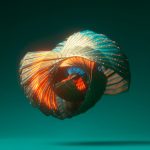WUST Professor Develops Efficient Two-Bit Quantum Logic Gate

(WUST.edu) Jung-Tsung Shen, associate professor in the Washingington University of St. Louis Department of Electrical & Systems Engineering, has developed a deterministic, high-fidelity, two-bit quantum logic gate that takes advantage of a new form of light. This new logic gate is orders of magnitude more efficient than the current technology.
“In the ideal case, the fidelity can be as high as 97%,” Shen said.
The potential of quantum computers is bound to the unusual properties of superposition — the ability of a quantum system to contain many distinct properties, or states, at the same time — and entanglement — two particles acting as if they are correlated in a non-classical manner, despite being physically removed from each other.
Where voltage determines the value of a bit (a 1 or a 0) in a classical computer, researchers often use individual electrons as “qubits,” the quantum equivalent. Electrons have several traits that suit them well to the task: they are easily manipulated by an electric or magnetic field and they interact with each other. Interaction is a benefit when you need two bits to be entangled — letting the wilderness of quantum mechanics manifest.
The measurement discovery was groundbreaking, but not quite game-changing. That’s because for every 1,000,000 photons, only one pair became entangled. Researchers have since been more successful, but, Shen said, “It’s still not good enough for a computer,” which has to carry out millions to billions of operations per second.
Shen was able to build a two-bit quantum logic gate with such efficiency because of the discovery of a new class of quantum photonic states — photonic dimers, photons entangled in both space and frequency. His prediction of their existence was experimentally validated in 2013, and he has since been finding applications for this new form of light.
Shen has been working with the University of Michigan to test his design, which is a solid-state logic gate — one that can operate under moderate conditions. So far, he says, results seem positive.
Shen says this result, while baffling to most, is clear as day to those in the know.
“It’s like a puzzle,” he said. “It may be complicated to do, but once it’s done, just by glancing at it, you will know it’s correct.”



















